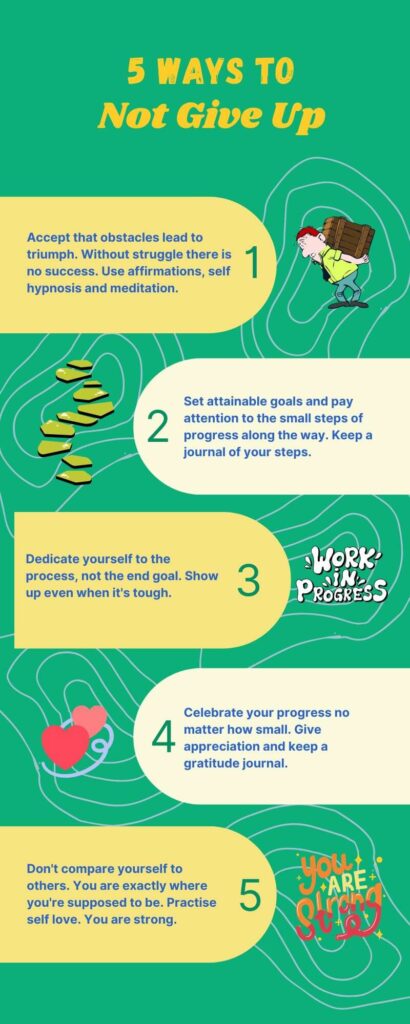So are you wondering how to stop being a quitter? You’ve already identified the signs that you give up too easily and now you’re looking for real change.
Getting mindful of the moment when we give up helps us to understand why we give up easily in the first place.
Once we’ve nurtured some awareness about the moment of quitting, then we can vamp up our determination by switching out our subconscious beliefs, taking practical steps and creating new habits.
One of the biggest tools which we can use is practising daily mindfulness. Active mindfulness will help you to become more aware of the specific moment that you give.
But by then it’s too late, right? Well yes and no. We can start by becoming aware of the moment and then reverse engineer it to its source.
Some of the action plans shared here may not resonate with you. Choose the ones which do and apply them to your life to create a new-born determination. Allow it to grow over time.
It isn’t always easy to keep going and not quit, so don’t beat yourself up. Do your best and know that you’re on a journey to a more resilient self.
Be kind to yourself.
There’s really nothing to stop you from unlocking your potential for success.
Ask yourself, Is it really time to give up on my dreams? And if the answer’s a resilient ‘no’, then take a look at these strategies to help you keep on keeping on.
Table of Contents
- #1 Remind Yourself that Perfection Doesn’t Exist
- #3 Not Everything That’s Meant-to-Be Comes Easily
- #4 Don’t Expect too Much of Yourself
- #5 Forget about External Validation
- #6 Don’t Rely Purely on Motivation
- #7 Believe in Yourself
- Exercises to Help You Stop Being a Quitter:
- You Aren’t a Failure, You’re Perfectly Imperfect
#1 Remind Yourself that Perfection Doesn’t Exist
If we cling to an image of perfection, this can lead us to giving up prematurely because the struggle feels wrong when judged by a perfectionist criteria.
When we believe that we need to be perfection-personified, you know, the kind of person who gets absolutely everything tickety-boo right every time, then we set ourselves up for failure.
And when difficulty comes along, we see an image of imperfection reflecting back at us.
So to avoid that discomfort of imperfection, we quit.
This may be simplifying and exaggerating the scenario, but any degree of extreme-perfectionism can lead to disillusionment, which can then lead to quitting.
Perfectionism Made Me a Quitter
When I was a child I lived through this. Being an extremely shy kid, I felt deeply disturbed whenever I was supposed to dance.
Not only did I have no idea how to move my body in time with the music and no feel for the rhythm of the beat, but I also felt completely ridiculous standing there ‘not getting the groove’.
As if that wasn’t bad enough, I then had to deal with all the comments, insisting that I must dance.
So what did I do? I decided to say, ‘I don’t dance‘. For the rest of eternity.
End of. No more suffering.
I quit.
Except that I didn’t realise I was quitting.
And in hindsight of course, my life would have been much easier if I I’d pushed through the discomfort and learned how to move and groove to the music even just an itsy-bitsy teeny-weeny little bit.
But instead I quit.
If this sounds like you (not the dancing you understand, just the quitting), then reframe your idea of what validates you as a person. Know that you’re perfect with your imperfections and that anything perfect can only become perfect by being supported and built on the back of imperfection.
One can’t exist without the other.
When Thomas Edison was asked why he hadn’t given up already with so many failures under his belt, he answered that there were no failures, but that there were 100 steps to creating the successful lightbulb.
We could all learn a lesson from Thomas Edison.
#2 You Aren’t a Failure When You Fail
When we fail at something, that doesn’t make us a failure.
To really drum this into your subconscious beliefs, think about this . . .
‘If you want to think big, embrace the insults. Embrace the difficulties. Because there’s a direct correlation between how many times you’ve fallen, or how many hurdles you’ve hopped over, and how well prepared you are for living big.’
Do you think famous people, successful gurus or renowned leaders got where they are without having some wobbles along the way? Or a hundred thousand failures before they made it big.
The only difference is, they kept going. They fell down and stood right back up. They dusted themselves off and started afresh.
Next time you’re about to quit something, ask yourself.
‘Am I quitting so that I can start something better? Or am I really quitting-quitting?’

If you’re quitting-quitting, write about it in a special place (keep them all in the same book/page) and explain to yourself in depth why you’re taking this action and what made you decide to quit in the first place. Justify it in your writing.
The next day, look back on your reasoning and see if it still holds up to logic, and if it’s still the right decision for your best interests.
#3 Not Everything That’s Meant-to-Be Comes Easily
It’s true that if it’s meant to be, doors will open. Yes. Things flow, we get in the groove.
But if the doors which open are beyond our comfort zone, we won’t even see them. We’ll be too busy staying put within our own self-imposed glass-palace walls, built by us to keep ourselves safe and comfortable.
And if we decide to push our boundaries and venture out of our comfort zone, then things may not feel so easy anymore.
That’s not because the universe isn’t helping you, it’s because you’re in unfamiliar territory. The easiest reaction is to turn and run straight back to the palace and its comfortable security.
Only problem with that is, we then don’t get to experience the challenges that are beyond the perimeter.
If you’re doing a project and you get so many obstacles that you want to give up too soon, double check that this is actually what you want to do.
If it resonates, keep going.
If it doesn’t, you’ve got a reason to quit. And it’s a valid one.
#4 Don’t Expect too Much of Yourself
If we demand too much of ourselves, we may find ourselves repeatedly quitting because we can’t realistically achieve what we’ve set out to achieve.
Take a step back and look at the bigger picture. Set yourself baby steps and focus more on the journey than the result.
#5 Forget about External Validation
You’re enough. You’re good enough. You’re smart enough. You don’t need somebody to externally validate you. Yes, it’s nice to have our work appreciated.
Sure, it keeps things trundling along quite nicely, but if you’ve checked in with your inner guidance to see that this thing resonates with you, then you don’t need anybody else to pump your ego.
#6 Don’t Rely Purely on Motivation
Motivation’s a great thing. Miraculous actually, the way it can just surge through our veins, converting us into a machine-in-action.
But here’s the thing. Nobody can complete a whole project on motivation alone if they want to produce or take action consistently every day.
Motivation goes up and down. More for some of us than others, but the nature of motivation is to come in waves. So when the tide’s out, our motivation will be at a low ebb.
So instead of relying on motivation and ultimately quitting the task in hand when motivation is out with the tide . . . Instead of that, set yourself some working hours. Make a game-plan. A plan of attack.
And when you don’t feel motivated, work on the project just the same. Turn it into a habit.
#7 Believe in Yourself
Finally, learn to believe in yourself. Love yourself. Give yourself appreciation every day.
Know that you’re incredible. A miracle of life.
We’re all just miracles of life, all sharing the same spot in space, each thinking we’re lesser than the next. We’re not. We’re not more or less than anyone.
You’re amazing.
Exercises to Help You Stop Being a Quitter:
- Who do you know that is actually perfect? What can we do to accept mediocre as being a valid part of our lives? Meditate on this question daily for 5 days and see what comes up for you.
- Take a page in your journal or in your book of magic drawings and write down of all the things you want to see appear in your new mindset. Write in different colours and decorate the page with swirls and stars or whatever, so that you make it personal. Add to it whenever you get a new example of perfectionism sabotaging your life. Write out the counter-balance.
- Practise self-hypnosis. When you’re in deep, start a virtual journey to your own special garden, then travel across the river. Once on the other bank, choose the cave of understanding to visit. Sit on the chair in the centre of the cave and look around you. What do you see? Who do you see? Ask the question: Why do I need to be perfect? and listen carefully to the answers that come back to you. If you hear an angry voice answering that of course you need to be perfect, thank that voice and ask him/her to sit at the side of the cave to listen. Tell him/her that you’ve heard his opinion and now you want to hear other voices’ opinions. Visualise this angry part of yourself sitting at the sidelines, quietened and observant. Ask the question again and wait for another answer. You can repeat this exercise every night in your self hypnosis session until you feel it no longer springs to life with answers from within your mind. You will get some vital intuition and responses which can help you to change your mindset from quitter to stayer.
- Get yourself a journal for planning your steps and creating a game-plan. Make sure the steps are small and reachable. Write down all your observations at the end of each day and don’t forget to include something you’re grateful for every day.
- Create a set of 5 affirmations specifically for your own situation. Here are a few suggestions: I am whole. I don’t need to seek perfection. I embrace the yin and the yang of life. Without struggle I can have no success. I create my own reality. I do not give up.
You Aren’t a Failure, You’re Perfectly Imperfect
Failure comes to all of us.
It’s how we label the experience and how we perceive it that matters. (Actually failure isn’t failure at all unless we give up and let it define us.)
Just because you think you’re failing at something doesn’t make you a failure.
On the contrary, it makes you a warrior of life. It gives you your journey and your story. Through failure comes the strength to succeed and the knowledge to progress.








